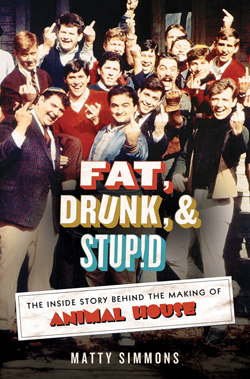For almost 80 years, Kirkus Reviews has served as the industry bible for bookstore buyers, librarians, and ordinary readers alike. Now Popdose joins the Kirkus Book Bloggers Network to dish on the best — and sometimes the worst — in pop-culture and celebrity books.
This week, we make a truly futile and stupid gesture…
 In the week that I write this, there have been two stories in the news about college fraternities. The first — the more depressing, and the less surprising — concerns the Greek system at Dartmouth College, which has come under fire following disturbing revelations regarding the hazing of pledges. (Google the specific allegations for yourself, if you dare; they’re far too vile to go into here.)
In the week that I write this, there have been two stories in the news about college fraternities. The first — the more depressing, and the less surprising — concerns the Greek system at Dartmouth College, which has come under fire following disturbing revelations regarding the hazing of pledges. (Google the specific allegations for yourself, if you dare; they’re far too vile to go into here.)
As heinous as these actions are, they can be explained by the human tendency towards escalation. Minus any mediating outside authority, in a closed system of tradition, ritual actions will inexorably scale up with succeeding iterations. Say that a freshman pledge has to drink raw eggs as part of his initiation. Four years later, when that same kid finds himself acting as Rush Chairman, is he going to say, ”You know what? Let’s just have the freshmen each shotgun a single beer and call it a night”? No chance. Rather, he’s going to push things are far as he dares — and the next class will push things farther still, until some poor bastard’s in the back of an ambulance getting a pint of horse semen pumped out of his stomach.
The Dartmouth houses, perhaps not coincidentally, served as the basis for the fictional fraternities of Animal House, the classic 1978 movie comedy. The story of the film’s making is told in Fat, Drunk, and Stupid: The Inside Story Behind The Making Of Animal House, the new memoir by Matty Simmons, founding publisher of the National Lampoon. Simmons reveals that Chris Miller — who wrote the Lampoon stories that inspired Animal House, and co-wrote the screenplay — was not just a Dartmouth alum; he had, in fact, been the original Pinto.
Animal House is widely credited with (or, depending on who you talk to, reviled for) starting the wave of gross-out comedies that continues unabated to this day. Watching the movie now, in the light of what has followed, you can see that the principle of escalation at work. Animal House will never be mistaken for warm-and-fuzzy nostalgia; that shot of the flying beer keg, tearing through the parade-float of JFK’s head, makes that plain. (As Simmons tells the story, that sequence gave even him pause.) But for all its shock tactics, the film is essentially celebratory. But where more recent films in the gross-out genre — the Hangover and American Pie movies, for instance — are predicated on contempt for the characters, Animal House has a palpable affection for its gallery of rascals.
Read the rest of this article at Kirkus Reviews!





Comments